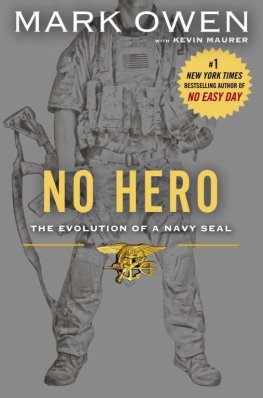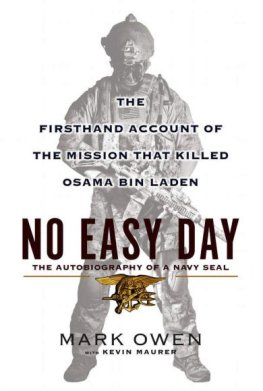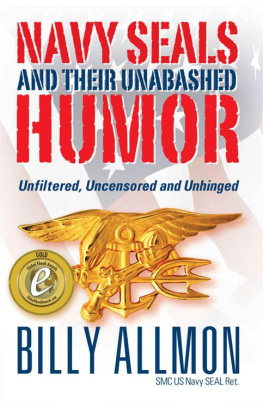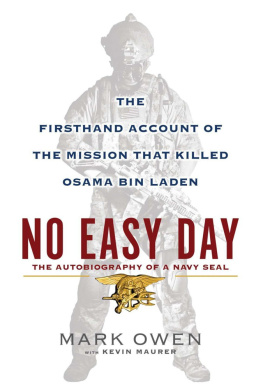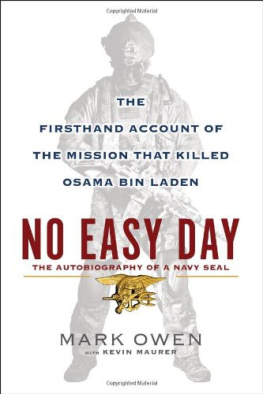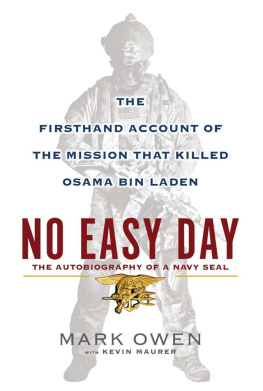Publishers Note
The author submitted this manuscript for review by the Defense Office of Prepublication & Security Review (DOPSR) at the United States Department of Defense. Some material not essential to the book was removed or rewritten during the review process. In some cases no agreement between the author and DOPSR could be reached, and in those instances the passages in question have been redacted. The names of all individuals in the book have been changed for their security.
The views expressed in this publication are those of the author and do not necessarily reflect the official policy or position of the Department of Defense or the U.S. government.

PROLOGUE
Forty Names
I was home in Virginia Beach on standby when the texts started coming in.
It was August 2011 and the city was packed with tourists. Every day I drove by people on vacation, heading to the ocean for a day on the beach. I stayed away from the Oceanfrontthe area that runs parallel to the beacheswhere the T-shirt shops and mini golf courses attract sunburned vacationers. The tourists were in a beach state of mind, but all I could think about was Afghanistan and my upcoming deployment.
The dog and pony show of dignitaries and political leaders was finally over. Now the prospect of going back overseas had me straining against a leash like a dog, ready to get back to work. But first I had to survive standby.
Standby was the worst.
It was one spin after another. We got a weekly brief on the latest intelligence from the worlds hot spots, which actually made things worse. We all wanted to be working, conducting actual missions. But during standby, all we could do was plan for missions that would probably never happen. Overseas it was common to get a mission, put together a plan, and execute it a few hours later. But most of the operations we were involved in during standby were spur-of-the-moment contingency operations that would eventually disappear. Wed spin up, plan the operation, only to spin back down as Washington decided on another option, or the hot spot cooled off. Making it worse, we were living at home, but we had very little time actually being at home with family. We had to keep our families at arms length because we never knew when wed suddenly be gone. Id stick them in the same compartment in my brain that I used during deployments. For me, I was gone during standby, even if my parents could call me on the phone.
I know it was the same for every teammate. We all just wanted to get into the action.
It was early evening and Id just finished dinner. We werent supposed to drink or party on standby. The last thing anybody wanted to do was show up drunk for a possible mission. I was looking at a lazy night in front of the TV when I received a series of text messages about a helicopter crash. The messages all read the same.
Theres a CH-47 down in Afghanistan. Ours?
It was what we call rumint, a mix of real news and rumor that oftentimes turned into bullshit. Unfortunately, this time it would turn out to be true.
I had to see only one text before my mind started turning. If it was true, it didnt matter if it was SEALs, Delta, or Special Forces. They were teammates in the same fight. I called a good friend of mine who was on the squadron that was overseas. He wasnt with his team because he was home taking care of his mother, who was sick. I thought he might know something.
No answer.
I kept scrolling through my phone, calling anyone who might have information. Then I got the confirmation.
It was ours.
The news hit me like an electric charge. In my head, I could see all of my buddies in that squadron. My cell phone buzzed as the news spread. The same message kept coming up.
It was ours.
My stomach hurt. I couldnt sit still. I paced in my kitchen, my head down, scrolling through texts, waiting for more information, but dreading each new piece. I knew my teammates had all volunteered countless times to be in that exact place, doing what they were doing. It could have easily been me in the helicopter. Hell, Id been in a helicopter crash a few months earlier. It was harder being back at home waiting for word, a feeling most of our wives and girlfriends knew all too well.
After a while, I couldnt be alone. I grabbed a twelve-pack of beer from the fridge and walked down the street to a fellow SEALs house. We were going to need a few beers tonight.
The sun was fading and the streets were deserted. As I walked the few blocks to my buddys house, I looked around the neighborhood. The development was new, with few trees. Large brick houses sat on manicured lawns. On the weekends, I watched my neighbors stress over their lawns, mowing and manicuring the bushes to perfection. It made the streets look peaceful.
Most of my neighbors were oblivious to what I or any of the guys who came to my house did when they were at work. As I walked past the houses, I was sure my neighbors were thinking about summer vacation plans, bills, or what baseball game they were going to watch that night. It struck me how wide the chasm was between what was going on in Afghanistan and what was happening at home. I knew my neighbors cared and supported the troops, but they had no idea what it was like and how often my teammates risked their lives. The war was largely absent from daily life at home except for the families left behind to wait for their sailor or soldier to return.
They would never understand the amount of sacrifice being performed by our military on a daily basis. There was nothing I could do to change that, and tonight, it really didnt matter. The sacrifice was made. Now it was left to us to make sure it wasnt forgotten. The disconnect between those of us who put our lives on the line and the rest of the country was never as stark for me as it was on that quiet night.



